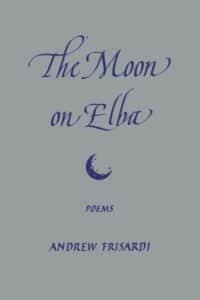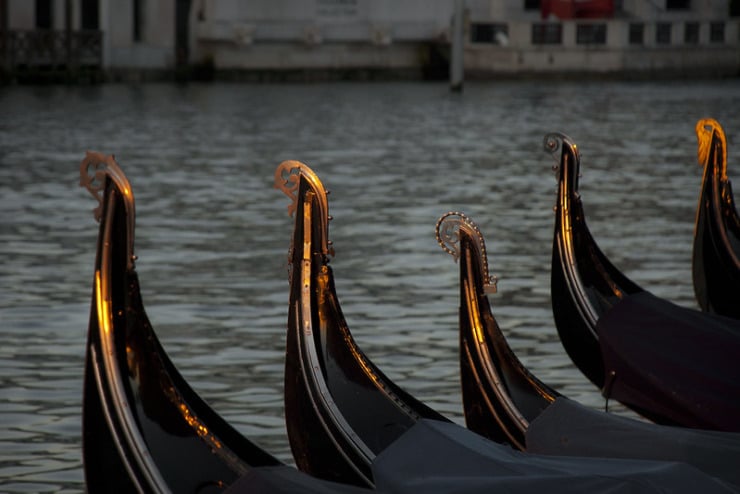Expat Andrew Frisardi finds poetry in Italy
To read the poems of The Moon on Elba is to walk through a series of dreams. The new collection by poet and translator Andrew Frisardi brims with beauty in themes, descriptions, and words. At times, the collection seems intoxicating.
Frisardi is a native Bostonian, but he moved to central Italy to focus on Dante scholarship and translations. His translation works include two books of literary essays, Ancient Salt: Essays on Poets, Poetry, and the Modern World (2022) and Love’s Scribe: Reading Dante in the Book of Creation (2020). He’s published a dual-language critical edition of Dante’s Convivo and an annotated translation of Dante’s Vita Nuova.

Andrew Frisardi
Along with his previous poetry collections, Death of a Dissembler and The Harvest and the Lamp, he’s also published translations of the Italian poets Franco Loi (1930 – 2021) and Giuseppe Ungaretti (1888 – 1970). The move to Italy has been obviously a productive one.
While not the subject of every poem in The Moon on Elba, the idea of Italy courses through the collection. Dante is clearly here as well. As you read the poems, you step into another world, one that’s somewhat familiar but not the everyday experience. This is the hint of another world, one that exists but not one we live in daily. I kept thinking of Plato and his chair. Frisardi’s poems hint at or suggest the ideal that exists behind the real.
The collection contains 42 poems. Frisardi begins with a poem entitled “Word,” a kind of meditation on the meaning of “word.” Rather than offer a concise definition, he provides a list of what it can be — house, hello, growing root, an uttered oath, a bride, white, and “the certainy of doubt.” The title poem, “The Moon on Elba,” is a ghazal in which the rhyming and repetitive ends of the couplets are “creeping on Elba,” “Leaping on Elba,” “keeping on Elba,” and several others. Reading it aloud, you understand all of the kinds of shadows and lights cast by the moon.
A number of the poems are about Italy — the countryside, the Mediterranean, the Tiber valley, the cities and towns, the poets, and the people. Frisardi even includes a poem about an American living in Italy.
Estranged: Lines of an American Expat

That streaks the sky like contrails spread
Across the sea. Your fertile body
Gave me a life before I woke
To sleepwalk where my dreams had led,
Oblivious there’d been a rift.
Though distant, you still have your hooks
In me. Your plain talk has gone shoddy,
Your ruddy natural good looks
Are faded, yet your undertow
Still raises riptides in my blood.
Marking our continental drift
Apart, our first of fire and flood
Are all goodbyes and half hello.
My mother, my love, our past runs deep.
We don’t know what is going wrong,
To whom or where we now belong,
As we turn and toss and turn in sleep.
In his addition to the published books and poetry collections, Frisardi has also published poems and articles in such publications as The Atlantic, The Hudson Review, New Criterion, New Republic, and The New Yorker, among others. He’s also received a Guggenheim Fellowship, a Hawthornden Literary Fellowship, and the Raiziss / de Palchi Translation Award from the Academy of American Poets.
The Moon on Elba is a beautiful collection. It’s rooted in Italy and, to a degree, in Dante. It’s filled with an almost ethereal light. And it points to something greater than the words themselves, a story or idea behind the words, an ideal we experience in a deep part of the soul.
Photo by Vitorio Benedetti, Creative Commons, via Flickr. Post by Glynn Young.
How to Read a Poem uses images like the mouse, the hive, the switch (from the Billy Collins poem)—to guide readers into new ways of understanding poems. Anthology included.
“I require all our incoming poetry students—in the MFA I direct—to buy and read this book.”
—Jeanetta Calhoun Mish
- Poets and Poems: Avraham Stern and “A Soldier and a Poet” - July 15, 2025
- Poets and Poems: Beth Copeland and “I Ask the Mountain to Heal My Heart” - July 10, 2025
- A.E. Stallings: the Parthenon Marbles, Poets, and Artists - July 8, 2025


Leave a Reply